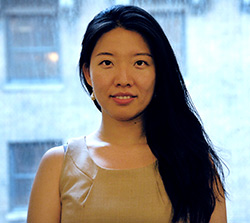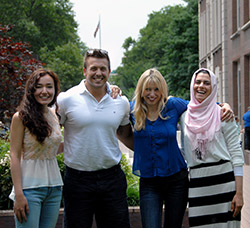The Spirit of Summer
Through a new program in spirituality and psychology, the paths of 32 seekers converged at TC for three weeks in July
“Now, the way it’s going to work out in this gorgeous young woman’s life will depend on how we sing to her.”
The British orchestral conductor and motivational guru Benjamin Zander was addressing the inaugural cohort of TC’s Spirituality Mind/Body Summer Intensive program one sunny morning in late June. He turned to 25-year-old Dila Sultanova, who stood next to him on a chair.
“Now, Dila, these people love you and know that if you have an extraordinary life untold numbers of other people are going to be affected. So your job is to accept what’s about to hit you as a gift.”
Over the next 10 minutes, while Sultanova stood blushing, Zander, white-haired and beaming, led the group through multiple renditions of “Happy Birthday,” prodding them to gesture emphatically, stress different words, sing louder, and, ultimately, implore Sultanova with their arms outstretched.
When the last notes had died away, Zander nodded his approval. The choice of how to sing “Happy Birthday,” he told the group, is a microcosm of the choice for how to approach any situation in life. You can shrug in resignation, clench your fists in anger or raise your arms and search for possibility. Each is a valid response, but the search for possibility begins with one simple question: “What assumptions am I making that I don’t even know I’m making? And what can I invent that I haven’t invented that would give me something new?”
Two years ago, Lisa Miller and Teachers College took the third path, launching the nation’s first Ivy League master’s degree concentration in spirituality and psychology. Featured in The New York Times, the program, a unique blend of faith and science, drew 165 students in 2013 and 211 this year. Meanwhile, Miller, Professor of Psychology and Education, and her team were receiving hundreds of inquiries from others who wanted to attend but couldn’t drop their careers and family responsibilities to go to school full-time. Solution: this past July, Miller launched the Summer Intensive, bringing together 32 participants for three weeks on the TC campus, to be followed by nine months of online collaboration and independent study.
“Intensive” may, in fact, be an understatement.
“Many of our students had been searching years or even decades for this type of innovative experiential learning in an institution of higher education,” said doctoral student Sarah Sherman, Director of the Spirituality Mind Body Summer Intensive Master's Program. “They told us they experienced ‘uncontrollable joy’ and unique connection.”
Meet five students from the Spirituality Mind/Body Summer Intensive
From the day the students first arrived (from as far away as China, and from fields ranging from high finance to biopsychology), they seemed to bond with Miller, Sherman and Ellie Cobb, Doctoral Director of the Summer Intensive, who helped design the program; with the many guest speakers and faculty members; and, above all, with one another.
“Our group is so powerfully dynamic,” said Matthew Evans, who owns a holistic health club in the United Kingdom but chose to relocate to New York City to “fulfill a lifelong dream.” “Meeting them has been a breath of fresh air and a reminder that we are at the forefront of spiritual activism. Understanding our potential will unite us forever.”
First and foremost, Miller and her team sought to promote the personal spiritual growth of each participant – something that those already doing spiritually oriented work as a livelihood particularly appreciated.
“This program marks a genuine pedagogical shift,” Cobb says. “Where most graduate programs focus on performance and evaluation, ours emphasizes self-reflection, professional growth through openness and receptivity, and integration of one’s own journey with academia, science and the connection to others.”
The students were also exposed to a wide range of spiritual practices from other cultures, faiths and fields. Visiting scholars and speakers included Rabbi-Hazzan Shaul Marshall Praver, who spoke with President Obama at the memorial for children killed in the Sandy Hook school shootings in Newtown, CT; the Hindu leader Mātā Amṛtānandamayī Devī, known as Amma (“mother”), who has founded universities and hospitals in India and is said to have embraced and comforted more than 33 million people around the globe; Matthew Stinchcomb, whose title at Etsy, a global e-commerce website that preaches commerce as a form of human interaction, is Vice President for Values and Impact; and Diana Muenz Chen, a medium who claims to channel the energy of angels.
“Our guest scholars are all spiritual activists in different ways,” Miller said. “They connect their beliefs to their work to improve the world.”
But the program’s biggest draw may have been its presentation of scientific findings about spirituality’s physiological and mental impact. The speakers included Gary Schwartz, Director of the University of Arizona’s Laboratory for Advances in Consciousness and Health; Andrew Newburg, Director of Research at the Myrna Brind Center for Integrative Medicine at Thomas Jefferson University Hospital; religious leaders; and Miller herself, who for the past 15 years has been steadily building an empirical case for the idea that – to put it very simply – a smile really is just a frown turned upside down.
In brain-imaging studies conducted in the United States, China, India and Brazil, Miller’s lab has accumulated evidence that depression and spirituality may be two sides of the same coin. Specifically, they have observed a thinning of the prefrontal cortex in those who are chronically depressed, versus a cortical thickening in people who regularly practice some kind of faith or spirituality.
“We think the vast middle range of depression may reflect developmental landmarks that have a spiritual component,” Miller says. “We’re asking, ‘Are there chapters of spiritual emergence that initially rear their heads with elements of depression? And even more broadly, ‘Is there a core human capacity for transcendence that takes on a cultural overlay?’”
As the students in the program delve into such questions through their independent study projects, they will benefit from the ability to share thoughts, findings and other observations online.
“We have a jewel – a sacred spiritual community, with mentors and guides of all ages – and the online format gives them the opportunity to go into each other’s lives and share their meditation, their leadership styles at work, their conflicts with their spouses,” Miller says. “I’m so excited about this program. It speaks to the hunger out there among so many people for a more spiritually infused world.”- Joe Levine
Published Thursday, Sep. 4, 2014

